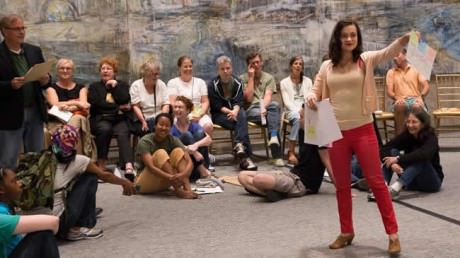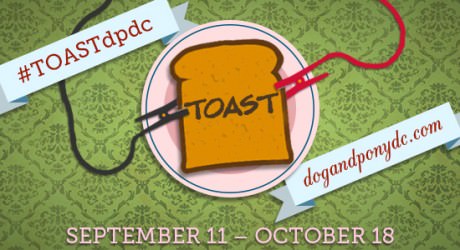I last partook of this tasty audience-integration treat from dog&pony dc last December when I saw Toast as a workshop production in the Kogod Cradle Series. The immersive experience was all about innovation and invention, and it was (literally) tasty: There was a table where you could interact with the premise by creating your own flavored butter, and mine was m-m-m-m-yummy. So I felt a twinge of disappointment when I heard that after nine months of gestation and improvisation on the innovation/invention theme, Toast would be popping up around town sans the flavored butter.
I needn’t have fretted, because the new iteration of Toast that dog & pony dc has cooked up is curiously more immersive and in fact far more (metaphorically) chewy.
The gambit of the piece is still a heady notion about the way invention happens, and the way creative crowd-sourcing of ideas leads to better and better ones. That’s where Toast’s audience participation comes in; we are coaxed into fun brainstorming by members of dog & pony who greet and guide us in character as a variety of creative/inventive/facilitator types. But what seemed to me to have deepened about the piece and enriched it was a more transparent, cohesive intent on discovery not just for its own sake but for the good of all of humanity.
By some uncanny ice-breaking alchemy, the cast gets audience members who were complete strangers moments ago to share notions in small buzz groups with the kind of easygoing engagement usually reserved for long-time friends. I was in a group that was tasked with letting some essential feature of the common toaster inspire us to envision some sweeping new technological platform and practical application in order to solve a big problem. That may make no sense to anyone who wasn’t there, but to those of us who were, the challenge had a marvelously invigorating effect on our minds, and we ended up solving world hunger with an idea for a magic leaf that would use solar energy to convert inedible matter into nutritious food the way plants photosynthesize.
At first when you enter Toast (which I attended at a law office; the piece will occur at several venues), there’s an exhibit space with various displays on the theme of technological invention: A fortune-telling Ben Franklin impersonator, a doll house equipped with futuristic gizmos. I was captivated by a bright young boy who displayed his “science project,” a disassembled toaster, and knowledgeably explained to me infrared rays and other electronic esoterica. All of these devisings introduced us to the theme of innovation/invention and made it approachable, familiar, something ownable by each of us, not something “out there” where only Great Brains go to Think Stuff Up.
The genius of Toast is that as it engages audience members as participants in dramatized play, it democratizes creativity, and it makes an otherwise elusive truth seem self-evident and concrete: There’s genius in everyone if we but connect to it in one another.
The playful brilliance of Toast’s creators is contagious. Your brain will thank you for playing along.
Toast plays through October 18, 2014 at venues around the DC metro area. For venue information and tickets, visit their website.






